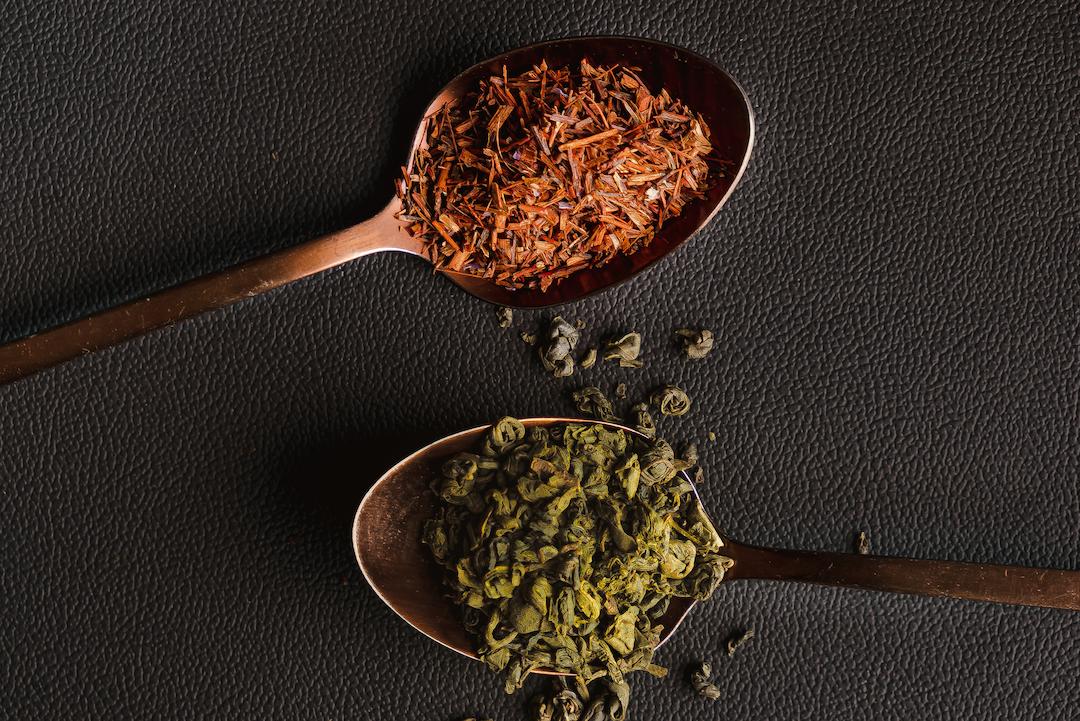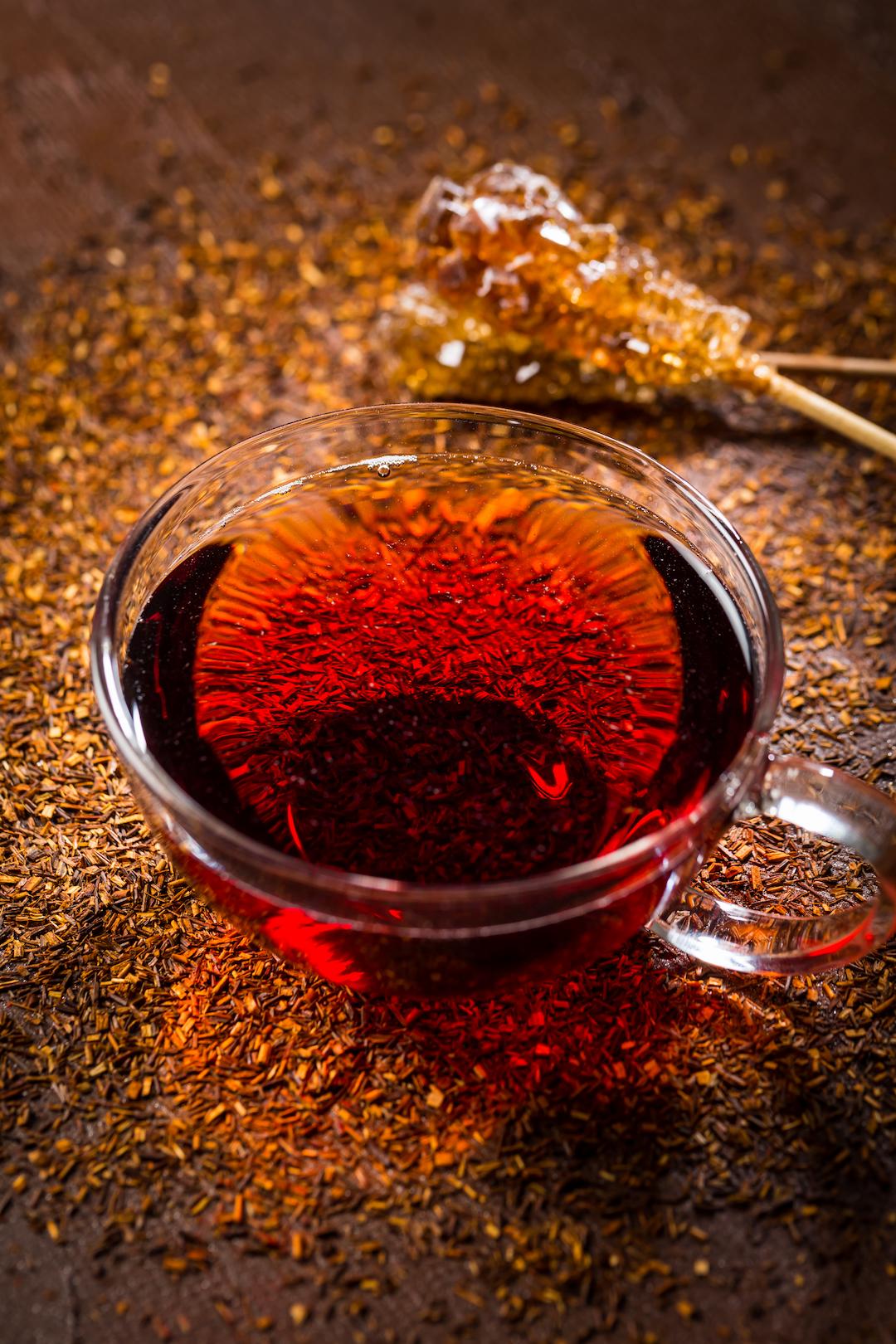Health Benefits of Rooibos Tea
Posted by Elise Goldsworthy BHSc (Nutrition Science) on 7th Mar 2022
Do you fancy a tea that boasts as much beautiful colour as it does health benefits? The wonderful amber-rich red of rooibos tea is a warming treat unlike any other herbal tea. Naturally caffeine-free, rooibos is a brew that promotes youthfulness, both inside and out. If it’s not already, rooibos should be a mainstay in your tea collection.
What is Rooibos Tea?
Rooibos Tea (Aspalathus linearis) is native to South Africa, from Cederberg in the Western Cape province. Rooibos tea (pron. roy-boss), also known as red bush tea is distinctly different from other herbal teas. It has some similar nutritional benefits to green tea or black tea, yet it is caffeine-free.
Rooibos tea is technically a tisane, and is made by brewing the fine needle-shaped leaves of the rooibos plant. It has a unique composition of polyphenols, vitamins and minerals which make it a wonderful tea to improve the skin, reduce allergies and maintain bone health. Rooibos also has a very special compound called Aspalathinwhich confers some interesting therapeutic benefits. Rooibos has a lovely, sweet and slightly nutty taste with warming cinnamon hints.
Rooibos Tea History & Cultivation
Rooibos tea leaves are long and fine and don’t resemble traditional tea leaves like camellia sinensis. They are green when plucked from the rooibos plant, then fermented to produce a rusty-red tea leaf, ready for brewing. The rooibos plant grows in Cederberg amongst dry sandy soil and can tolerate intense drought conditions. Some records confirm that rooibos tea has been consumed by local communities as early as the late 19th century.
Harvesting rooibos tea occurs in the African summer months of January to March. Bundles of tea leaves are collected and then transported to a tea processing plant. Here, the stalks are cut and tea leaves are dried (withered). Next, the rooibos leaves are fermented, which causes oxidation and results in their famous deep red colour and aroma.
Flavour & Aroma
Rooibos presents a slightly sweet, tart and aromatic flavour. It also has hints of vanilla and cinnamon which give a wonderful full-bodied tea experience. A barely-smoked undertone, due to the fermentation process, means rooibos tea lends well to milk, honey or made into a delicious latte.
The overall flavour of rooibos tea is mild yet satisfying. The earthen colour draws you in and grounds you as you enjoy each sip. Rooibos tea is also caffeine-free, like most other herbal teas, which means it can be enjoyed morning and night.

Rooibos Tea Nutrients
- Vitamin C
- Zinc
- Manganese
Polyphenols
- Aspalathin
- Flavones
- Flavanols
- Nothofagin
- Benzoic acid
- Cinnamic acid
Health Benefits of Rooibos Tea
The natural antioxidants and vitamins in rooibos mean this herbal tea has powerful anti-inflammatory properties which provides many health benefits. Rooibos tea has been traditionally used for respiratory, digestive and cardiovascular disorders. Unique to rooibos tea, is aspalathin, a compound found in the leaves which possess strong antidiabetic properties.
The research on rooibos tea is quite impressive. Important body systems, such as the heart, lungs and skin are all helped immensely by rooibos tea consumption. These health effects have been proven extensively by scientific research both in human trials and lab studies. Read on for the incredible health benefits of rooibos tea.
Supports Skin Health
An unusual feature of rooibos tea is its composition of vitamins and minerals. Vitamin C, zinc and manganese are all plentiful in rooibos tea and make it a skin-loving, antioxidant drink that’s perfect for promoting healthy skin. These nutrients all fight oxidative damage from the sun and environment, as well as help with wound healing. They also help in reducing scar formation and help give a youthful complexion. One clinical study reported on rooibos tea’s action of reducing wrinkle appearance by 9.9%. The results of this study also showed that rooibos tea has a soothing effect, improves skin tone and reduces skin irritation.
Anti-Cancer Properties
A powerful antioxidant called superoxide dismutase (SOD), naturally produced by the body is also found in rooibos tea. A lab study assessing the effects of rooibos tea on cancer and diabetes was published in the Journal of Traditional and Complementary Medicine. The authors found that SOD significantly reduced cancer cell development and the inflammatory impacts of high blood sugar. Rooibos tea has some important health potential in mitigating the damaging effects caused by cancer and diabetes.
Reduces Allergies & Asthma Symptoms
Rooibos contains bioactive flavonoids, which have anti-inflammatory and antioxidant actions that specifically target the respiratory system. Quercetin and chrysoeriol work synergistically to open the airways and relieve symptoms associated with asthma, wheezing and allergic rhinitis.
Another feature of rooibos is that it reduces proinflammatory cytokines responsible for cell and tissue damage. Similar to green and black teas, rooibos tea exerts protective effects on the body in general. This is achieved by reducing the deleterious impacts of inflammation from internal and external stimuli. Some of the worst culprits that cause inflammation in the body include toxins, environmental chemicals and infectious material. Rooibos tea is a potentially beneficial daily remedy for protecting against inflammation and promoting good health.
Improves Respiratory Health
Emerging research on the benefits of rooibos tea and respiratory health has gained increased attention in light of the covid-19 pandemic. The sequelae of health issues from coronavirus infections warrants novel therapeutic interventions. Foods and supplements as well as herbal teas have the potential to be powerful adjunctive therapies in the treatment of SARS-CoV-2 infections. According to some research, rooibos tea has potent anti-inflammatory, antiviral and immunomodulating properties. These enhance the body’s natural immune function and can help reduce the severity of a ‘cytokine storm’ and chronic lung injury induced by SARS-CoV-2.
Improves Bone Health
Rooibos tea contains manganese and other compounds that help maintain and build strong bones. Some research indicates that rooibos tea stimulates osteoblast activity, which are the cells that initiate new bone growth. The bone-protective effects of rooibos are further enhanced by their bioflavonoid content. One study has shown that luteolin and orientin can retain the minerals that contribute to bone strength. These polyphenols mimic the effects of oestrogen in the body, which may be particularly useful in post-menopausal women in maintaining bone integrity.

Does Rooibos Tea Contain Caffeine?
Rooibos tea is naturally caffeine-free. As someone who loves a flat white just as much as the next person, I also see a need for balance when it comes to caffeine. While caffeine has many positive health benefits, it also has some negative ones.
Caffeine stimulates the central nervous system and helps keep us energised, awake and moving throughout the day. However, if taken in excess, caffeine can interfere with some medications, cause heart palpitations and disrupt our normal circadian rhythms.
Caffeine can also impair the body’s natural detoxification processes in the liver. Feelings of sluggishness or exhaustion can sometimes be due to chronic caffeine overload. Ironically, this causes more caffeine intake in an attempt to feel better again. When what we really need is a break from it all!
If you’re looking to swap out your regular coffee or black tea for something herbal to reduce your caffeine intake, look no further than rooibos tea. It has a full-bodied flavour that can match the richness and depth you get from a strong black tea or coffee. (Mostly!).
How To Brew Rooibos Tea
Ready for a cup of rooibos tea?
Enjoy it cold for a refreshing break in the heat of summer or hot curled up with your favourite book on the couch in winter. This delicious South African tea is caffeine-free and can be enjoyed at any time of the day. It has a full-bodied flavour that can easily replace your mid-afternoon coffee routine if needed. Okay, let’s get the kettle on!
Prepare Your Tea Leaves
Whether you’re using fresh loose rooibos leaves or tea in a bag, there’s a simple method to follow for a lovely brew.
- For tea in a bag, simply brew according to the directions.
- For loose leaf tea, fill one heaped teaspoon of rooibos tea leaves for every 200 ml of water.
Boil Your Water
Wherever possible, use pure spring or filtered water to make your rooibos tea. Bring the kettle or water on the stovetop to a boil and pour over your tea leaves.
Steep Your Rooibos Tea
Rooibos tea should be steeped for at least 4 to 5 minutes for a strong and robust flavour. Brewing for up to 10 minutes should develop the flavours even further. This helps give an earthy, deep red colour and rich aroma which also maximises the health benefits of your rooibos tea.
- Leave the teabag in and enjoy as is. Remove if you’ve reached your desired tea intensity.
- Strain the tea into a cup after your brewing time is complete.
Enjoy on its own or with a dash of milk, squeeze of honey or a sprinkle of cinnamon. Yum!
Store rooibos tea in a dark, airtight container away from moisture or sunlight. This will preserve the freshness and flavour for as long as possible.

References
Chuarienthong, P., Lourith, N., & Leelapornpisid, P. (2010). Clinical efficacy comparison of anti-wrinkle cosmetics containing herbal flavonoids. International journal of cosmetic science, 32(2), 99–106. https://doi.org/10.1111/j.1468-2494.2010.00522.x
Gilani, A. H., Khan, A. U., Ghayur, M. N., Ali, S. F., & Herzig, J. W. (2006). Antispasmodic effects of Rooibos tea (Aspalathus linearis) is mediated predominantly through K+ -channel activation. Basic & clinical pharmacology & toxicology, 99(5), 365–373. https://doi.org/10.1111/j.1742-7843.2006.pto_507.x
Ku, S. K., Kwak, S., Kim, Y., & Bae, J. S. (2015). Aspalathin and Nothofagin from Rooibos (Aspalathus linearis) inhibits high glucose-induced inflammation in vitro and in vivo. Inflammation, 38(1), 445–455. https://doi.org/10.1007/s10753-014-0049-1
Mabuza, N., Kinfe, H. H., Godeto, T. W., & Ambushe, A. A. (2021). Estimated Contributions of Rooibos Tea to the Daily Manganese and Zinc Intakes Determined in Tea Leaves and Tea Infusions by Inductively Coupled Plasma-Mass Spectrometry. Biological trace element research, 199(3), 1145–1152. https://doi.org/10.1007/s12011-020-02211-x
Nash, L. A., Sullivan, P. J., Peters, S. J., & Ward, W. E. (2015). Rooibos flavonoids, orientin and luteolin, stimulate mineralization in human osteoblasts through the Wnt pathway. Molecular nutrition & food research, 59(3), 443–453. https://doi.org/10.1002/mnfr.201400592
Nash, L. A., & Ward, W. E. (2016). Comparison of black, green and rooibos tea on osteoblast activity. Food & function, 7(2), 1166–1175. https://doi.org/10.1039/c5fo01222h
Sheik Abdul, N., & Marnewick, J. L. (2021). Rooibos, a supportive role to play during the COVID-19 pandemic?. Journal of functional foods, 86, 104684. https://doi.org/10.1016/j.jff.2021.104684
Wikipedia Contributors. (2022, February 28). Rooibos. Retrieved from Wikipedia website: https://en.wikipedia.org/wiki/Rooibos, viewed February 28 2022
